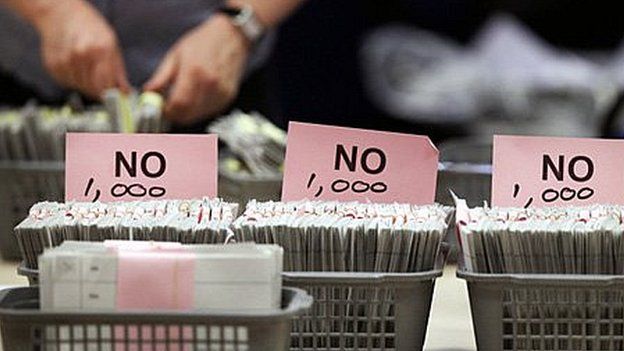Would alternative vote have affected the election?
- Published

In May 2011, voters said an overwhelming No to changing the way we elect our MPs. Four years on, with an uncertain general election looming, would the alternative vote system have made any difference to the outcome?
The referendum pitted the Conservatives against their partners in government the Liberal Democrats, who had made it one of their demands in the coalition agreement.
Although it was not their first choice, Nick Clegg's party saw Alternative Vote (AV), which allows voters to rank candidates in order of preference, external, as an improvement on the traditional first-past-the-post method.
After an ill-tempered campaign, it was rejected by 67.9% to 32.1%, with 19.1 million people taking part.
'Slight advantage'
AV itself was an "uneasy compromise" between the coalition parties, says Prof Paul Whiteley of Essex University. His view is that the Greens and UKIP might have picked up some extra seats but that the overall effect would not have been dramatic.
Another politics professor, Steven Fielding of Nottingham University, said the potential boost for smaller parties could have been "crucial", with recent polls suggesting a hung Parliament and talk focusing on potential post-election alliances.
He pointed to research , externalfor the British Election Survey which suggested that had AV been used at the 2010 general election, the Conservatives would have had 22 fewer MPs, and Labour 10 fewer, while the Lib Dems would have gained 32.
Alternative vote
Under AV, voters are able to rank the candidates in order of preference
A candidate getting more than 50% of first preferences is elected
If that doesn't happen, the lowest-placed candidate is eliminated and their second choices allocated to the remaining candidates
The votes are counted and if a candidate has over 50% this time they are elected. If not, the process is repeated
More recent figures come from pollster and former Conservative Party treasurer Lord Ashcroft, who looked at voters' second preferences in a poll , externalcarried out in December.
Among his findings was that UKIP voters were almost twice as likely to name the Conservatives as they were Labour as their second preferences.
Under AV, these second preferences are used to decide the outcome in places where no candidate wins more than 50% of votes cast.
'Unfair and crazy'
Lord Ashcroft said, external his findings suggested the Conservatives could have benefited from AV.
This view that the system opposed so strongly by the Conservatives - David Cameron called it "undemocratic, obscure, unfair and crazy" - could have helped the party is backed by Peter Kellner, president of pollster YouGov.
"In Tory-Labour marginals, second preferences of UKIP voters would have gone more to the Tories than to Labour - so if you've got seats where Labour takes them by 1,500 to 2,000 votes, the Tories might have taken them," he said.
"If AV had gone through, we would now be looking at the clear possibility of an outright Tory victory."
Mr Kellner also believes an indirect benefit to the Tories may have come in the form of boundary changes. He thinks the Lib Dems would have accepted redrawn Commons constituencies had AV been approved.
As it panned out the changes, backed by the Conservatives, were eventually dropped in 2013 after Lib Dem opposition sparked by the demise of their reforms to the House of Lords.
Voter experience
Political commentator John Rentoul, of the Independent on Sunday, said evidence of a major boost to the Conservatives under AV was "a bit mixed".
"A lot of the experience of AV in Australia is that it does change people's behaviour," he said.
"You can't just assume people will vote as they do under one system, under a different system."
Mr Rentoul believes the Conservatives and Lib Dems would have done "slightly better", while Labour might have recovered some votes from the Green Party.
Those who led the Yes campaign back in 2011 were reluctant to speculate on where it might have left the parties' prospects four years on.
Alexandra Runswick, of Unlock Democracy, said it would "not massively" have affected the eventual outcome.
But she added: "Where I think it would make a difference is in the experience of the voters.
"If you support a smaller party you could vote for that party. I think it would change the election for voters and I think it would be fairer for voters."